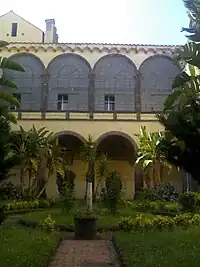Accademia degli Oziosi
The Accademia degli Oziosi (Academy of the Idle) was the most famous Neapolitan literary academies of the Renaissance.[1]
 The cloister of Santa Maria delle Grazie in Naples, where the Accademia degli Oziosi originally met | |
| Abbreviation | Gli Oziosi (“the Idle Ones”) |
|---|---|
| Formation | 3 May 1611 |
| Founder | Giovanni Battista Manso |
| Dissolved | c. 1700 |
| Headquarters | Naples, Kingdom of Naples |
Official language | Italian |
| Remarks | Motto: Non pigra quies |
History
The Accademia degli Oziosi was founded in 1611 by Giovanni Battista Manso, Marquis of Villa. The Academy was officially inaugurated on May 3, 1611 in the cloister of Santa Maria delle Grazie. It played a key role in introducing conceptismo to Naples, where orthodox Petrarchism had displaced the richly experimental poetry produced there in the previous decades.[1] The Academy soon became one of the places for the formation of the Neapolitan intellectual elite. When Giambattista Marino returned to his native city in 1624, he was elected the Academy's Principe.[1] After the death of Marino in 1625 Manso himself became Principe of the Oziosi, a position which he was to hold until his own death on 28 December 1645.[2]
The Academy originally met in the cloister of Santa Maria delle Grazie e Sant'Agnello. From 1615 onwards the meetings were held at San Domenico Maggiore.[3] The Oziosi numbered many notable men of letters, including Angelo Grillo, Giambattista della Porta and Giovanni Vincenzo Imperiale.[3] Among its foreign members the Academy numbered the brothers Bartolomé and Lupercio Leonardo de Argensola.[4]
The Academy enjoyed patronage from the viceroy of Naples Pedro Fernández de Castro, Count of Lemos.[3] In the early seventeenth century it was the most important cultural institution of the city outside the university. Manso introduced John Milton to the Accademia degli Oziosi in 1638.[5] By the mid 1650s the Academy became the launching platform for the literary careers of a long series of poets who moved conceptismo towards ever more elaborate and ornately erudite forms, most notably Giuseppe Battista.[1]
The Academy became defunct around 1700. The laws of the Oziosi are preserved in a manuscript in the Biblioteca Nazionale Vittorio Emanuele III.[6]
Members
- Torquato Accetto
- Bartolomé Leonardo de Argensola
- Lupercio Leonardo de Argensola
- Giuseppe Artale
- Giambattista Basile
- Giuseppe Battista
- Maiolino Bisaccioni
- Antonio Bruni
- Julius Capaccio
- Lorenzo Crasso
- Giambattista della Porta
- Girolamo Fontanella
- Angelo Grillo
- Giovanni Vincenzo Imperiale
- Giovanni Battista Manna
- Giovanni Battista Manso (Tardo)
- Giambattista Marino
- Vincenzo Mirabella
- Antonio Muscettola
- Margherita Sarrocchi
- Camillo Tutini
Notes
- Slawinski 2002.
- Haan 1998, p. 122.
- Calitti 2007.
- Pellicer, Juan Antonio (1778). Ensayo de una bibliotheca de traductores españoles. Madrid: Antonio Sancha. pp. 28 and 36.
- Diffley, P. (2002). Manso, Giambattista. ISBN 978-0-19-818332-7. Retrieved 6 June 2023.
{{cite book}}:|journal=ignored (help) - 'Regole dell'Accademia degli Oziosi,' BNN, ms. Brancacciana V.D.14 (miscellanea manoscritti), ff. 127r–134r. This text, first published in Carlo Padiglione, Le leggi dell'Accademia degli Oziosi in Napoli ritrovate nella Biblioteca Brancacciana (Napoli: F. Giannini, 1878), is now in De Miranda, Una quiete operosa, 327–43.
Bibliography
- Comparato, V. I. (1973). "Società civile e società letteraria nel primo Seicento: l'Accademia degli Oziosi". Quaderni Storici. 8 (23): 359–389. JSTOR 43776461.
- Haan, Estelle (1998). From Academia to Amicitia. Milton's Latin Writings and the Italian Academies. American Philosophical Society. pp. 118–129. ISBN 9780871698865.
- De Miranda, G. (2000). Una quiete operosa. Forme e pratiche dell'Accademia napoletana degli Oziosi. Naples: Fridericiana Editrice Universitaria.
- Aurelio Musi, “‘Non pigra quies’. Il linguaggio politico degli Accademici Oziosi e la rivolta napoletana del 1647–48,” in Musi, L’Italia dei viceré. Integrazione e resistenza nel sistema imperiale spagnolo (Cava de’ Tirreni, 2000, pp. 129-147).
- Slawinski, M. (2002). Oziosi, Accademia degli. ISBN 978-0-19-818332-7. Retrieved 18 June 2023.
{{cite book}}:|journal=ignored (help) - Calitti, Floriana (2007). "MANSO, Giovan Battista". Dizionario Biografico degli Italiani, Volume 69: Mangiabotti–Marconi (in Italian). Rome: Istituto dell'Enciclopedia Italiana. ISBN 978-8-81200032-6.